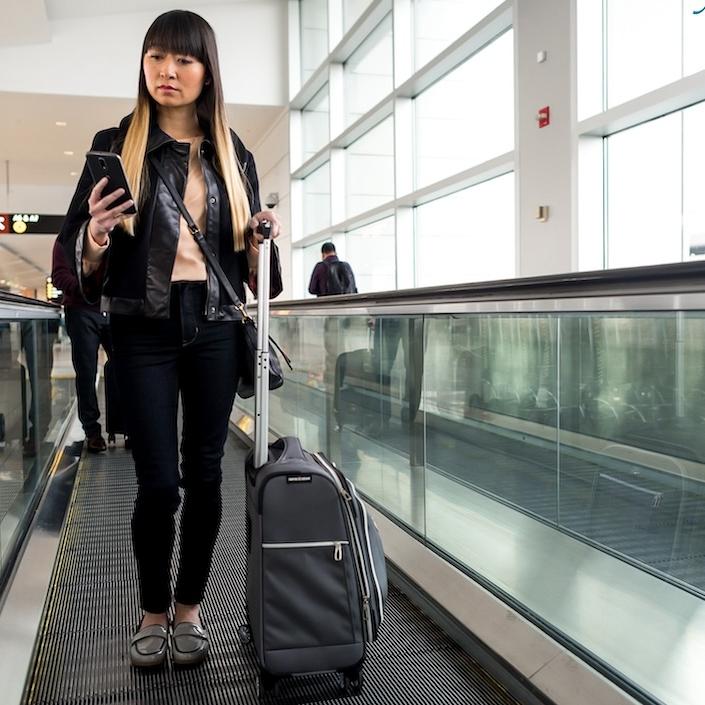Travel and Expense
On-demand Webcast | Navigating the Canadian Business Travel Landscape
In the webcast from SAP Concur, Preparing for the Future of Canadian Business Travel, Amy Padgett, Vice President, Travel Marketing Strategy at SAP Concur, digs into the priorities, needs and challenges in the travel landscape for Canadian businesses. She was joined by experts Michael Hook, Director of Sales North America, FCM Travel, and Kristen Hrycoy, Senior Global Partner Business Manager, SAP Concur.
Navigating Canadian business travel realities
The conversation started by acknowledging the evolving landscape of Canadian businesses and the importance of strategic travel planning. Kristen stressed the need for an employee centric approach, ensuring that travel programs support growth, employee well-being, and business agility.
Amy shed light on the generational shift and the increasing importance of sustainable business travel. Highlighting data from our 2023 SAP Concur Global Business Travellers Report, she emphasized that younger generations, particularly Gen Z and Millennials, are more likely to prioritize reducing environmental impact during business travel, citing that “...93% of Gen Z and 92% of Millennials are more likely to take actions to reduce their environmental impact while travelling for business in the next 12 months compared to Gen X and Baby Boomers.”
With that in mind, how can businesses incorporate these preferences into their strategies to attract and retain top talent? According to Michael, “It is important for Canadian businesses to understand data to set clear priorities.” He emphasized that traveller experience is paramount, requiring seamless, self-serving, and tech-enabled solutions. Michael also emphasized the significance of leveraging technology, including generative AI like ChatGPT, to enhance the overall travel experience.
Kristen added that to optimize travel programs, comprehensive strategies and solutions are paramount. She highlighted the shift towards traveller-focused management, where understanding traveller needs and using data analytics to identify patterns are key. Kristen stressed the importance of balancing traveller empowerment with aligning choices within travel policies, creating a more personalized experience.
Redefining business travel ROI
Strategic business travel planning involves making informed decisions about when, where, how, and why to travel. We are experiencing a generational shift in business that is making sustainable travel a business imperative. In responding to one of the audience poll questions, ‘what is the most critical aspect of redefining the ROI of business travel for a company?” many agreed that company ROI is being redefined, considering critical aspects such as improving employee productivity and maximizing cost savings.
Michael pointed out that “...businesses should emphasize efforts on the need for accurate and insightful analytics to make informed decisions and highlight the often-overlooked metric of lost savings. By doing this, they can optimize efficiency and drive savings.”
Amy further stressed the challenges of redefining ROI, citing that every dollar invested in business travel generates $12.50 in incremental revenue and the need for robust data sources to measure ROI effectively.
Advancing duty of care programs for employee well-being on the road
Kristen highlighted that a duty of care program is essential for ensuring the health, safety, and well-being of employees while travelling in a way that considers the physical, mental, and emotional aspects of travel. This can help business leaders strike the right balance between employee well-being and productivity during business travel. Kristen pointed out that “Duty of care extends beyond traditional risk management, now including considerations for the well-being of travellers. Business should emphasize at the need to engage human resource experts in creating comprehensive programs.”
Michael addressed the challenge of balancing employee well-being and productivity, noting that “Businesses are encouraged to adopt policies that prioritize the well-being of travellers, offering amenities and benefits tailored to ease the stress of travel.
All panelists discussed the importance of tracking employee wellbeing and productivity from a metrics perspective. When asked “what should be the primary focus for ensuring employee well-being and safety on the road?” the audience generally agreed that communication plays a vital role in emergency response, health and safety measures, employee training and resources, and customized itineraries to ensure employee wellbeing and productivity.
Looking ahead: anticipating 2024 trends
Technology continues to be a driving force in the Canadian business travel landscape. AI, machine learning, and chatbots are taking centre stage, promising increased efficiency in the booking process. Michael emphasized on the role of technology in enhancing the overall user experience, making the booking process quicker and more streamlined.
While increased adoption of virtual meetings and remote work takes the lead, there is a parallel desire for in-person interactions, encouraging business travel. Striking the right balance between virtual and physical presence is a trending preoccupation, acknowledging the benefits of face-to-face engagements in fostering meaningful connections.
To conclude the conversation, Kristen and Michael pointed out the importance of focusing on travel, making technology accessible and opening a dialogue with partners and suppliers, which comes down to adopting a proactive approach.
From sustainability to technology, from flexibility to finding the right balance between virtual and physical presence, businesses are gearing up for a transformative period. The journey ahead promises a landscape where innovation, environmental awareness, and personalized experiences all converge to define the future of business travel in Canada.
To hear more insights about how businesses can use travel solutions to face today’s challenges, watch the full webinar here.
